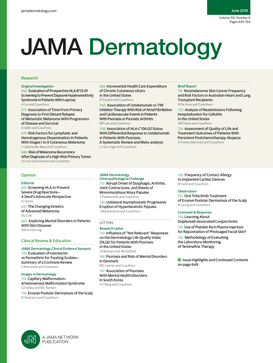以患者为中心的特应性皮炎复发定义共识
IF 11.5
1区 医学
Q1 DERMATOLOGY
引用次数: 0
摘要
重要性复发是特应性皮炎(AD)护理和临床研究中常用的术语,但对其含义却鲜有共识。同时,复发管理也是一项尚未得到满足的重要研究和治疗需求。了解各种疗法如何相对改善特应性皮炎发作,并将其作为衡量治疗效果的标准,可促进共同决策,并有助于在临床环境内外对疗效进行评估。目标确定患者报告的与特应性皮炎发作相关的属性,以制定以患者为中心、基于共识的工作定义。焦点小组以虚拟方式进行,在线调查则向全国湿疹协会会员进行宣传。主要结果和测量方法主要结果是就以患者为中心的发作定义中应包含哪些AD属性达成共识。使用评分表(范围为 1-9),对修改后的 eDelphi 语句评分达成共识的定义是:至少 70% 的参与者将某一语句评为 7 至 9 分(对病情发作的定义至关重要),少于 15% 的参与者将其评为 1 至 3 分(不重要)。结果完成焦点小组活动的 26 位注意力缺失症参与者(24 位年龄在 18-44 岁之间 [92.3%] ,2 位年龄在 45-64 岁之间 [7.7%];18 位女性 [69.2%])和完成调查的 631 位注意力缺失症参与者(平均 [SD] 年龄为 45.5 [18.1] 岁;533 位女性 [84.5%])被纳入分析。焦点小组就 15 项陈述达成共识,其中 12 项陈述在调查参与者中达成共识。超过半数的调查参与者(631 人中的 334 人 [52.9%])表示与他们的医护人员就什么是发作达成了一致,大多数人(616 人中的 478 人 [77.6%])表示,以患者为中心的定义将有助于他们与医护人员就自己的病情进行沟通。这种理解可以通过解决评估治疗效果的这一以患者为中心的关键问题来改善研究和护理。本文章由计算机程序翻译,如有差异,请以英文原文为准。
Consensus on a Patient-Centered Definition of Atopic Dermatitis Flare
ImportanceFlare is a term commonly used in atopic dermatitis (AD) care settings and clinical research, but little consensus exists on what it means. Meanwhile, flare management is an important unmet research and treatment need. Understanding how various therapies might comparatively improve AD flares as a measure of treatment effectiveness may facilitate shared decision-making and enable assessment of effectiveness within and outside clinical settings.ObjectiveTo identify patient-reported attributes associated with an AD flare to develop a patient-centered, consensus-based working definition.Design, Setting, and ParticipantsThis consensus survey study used a modified eDelphi method involving consensus-building focus groups and a survey conducted from January 10 through October 24, 2023. Focus groups were conducted virtually, and the online survey was advertised to National Eczema Association members. US adults aged 18 years or older with AD were recruited via convenience sampling.ExposureLived experience of AD.Main Outcomes and MeasuresThe main outcome was consensus on which attributes of AD to include in a patient-centric definition of flare. Using a rating scale (range, 1-9), consensus for the modified eDelphi statement rating was defined as at least 70% of participants rating a statement as 7 to 9 (critical to a flare definition) and less than 15% rating it as 1 to 3 (not important).ResultsTwenty-six participants with AD who completed focus group activities (24 aged 18-44 years [92.3%] and 2 aged 45-64 years [7.7%]; 18 women [69.2%]) and 631 participants with AD (mean [SD] age, 45.5 [18.1] years; 533 women [84.5%]) who completed the survey were included in the analysis. Fifteen statements reached consensus from the focus groups, and of those, 12 reached consensus from survey participants. More than half (334 of 631 [52.9%]) of survey participants reported alignment with their health care practitioner on what a flare is, and most (478 of 616 [77.6%]) reported that a patient-centered definition would be useful when communicating with their health care practitioner about their condition.Conclusions and RelevanceIn this study, participants with AD reached consensus on what an AD flare means from the patient perspective. This understanding may improve research and care by addressing this key patient-centered aspect of evaluating treatment effectiveness.
求助全文
通过发布文献求助,成功后即可免费获取论文全文。
去求助
来源期刊

JAMA dermatology
DERMATOLOGY-
CiteScore
14.10
自引率
5.50%
发文量
300
期刊介绍:
JAMA Dermatology is an international peer-reviewed journal that has been in continuous publication since 1882. It began publication by the American Medical Association in 1920 as Archives of Dermatology and Syphilology. The journal publishes material that helps in the development and testing of the effectiveness of diagnosis and treatment in medical and surgical dermatology, pediatric and geriatric dermatology, and oncologic and aesthetic dermatologic surgery.
JAMA Dermatology is a member of the JAMA Network, a consortium of peer-reviewed, general medical and specialty publications. It is published online weekly, every Wednesday, and in 12 print/online issues a year. The mission of the journal is to elevate the art and science of health and diseases of skin, hair, nails, and mucous membranes, and their treatment, with the aim of enabling dermatologists to deliver evidence-based, high-value medical and surgical dermatologic care.
The journal publishes a broad range of innovative studies and trials that shift research and clinical practice paradigms, expand the understanding of the burden of dermatologic diseases and key outcomes, improve the practice of dermatology, and ensure equitable care to all patients. It also features research and opinion examining ethical, moral, socioeconomic, educational, and political issues relevant to dermatologists, aiming to enable ongoing improvement to the workforce, scope of practice, and the training of future dermatologists.
JAMA Dermatology aims to be a leader in developing initiatives to improve diversity, equity, and inclusion within the specialty and within dermatology medical publishing.
 求助内容:
求助内容: 应助结果提醒方式:
应助结果提醒方式:


